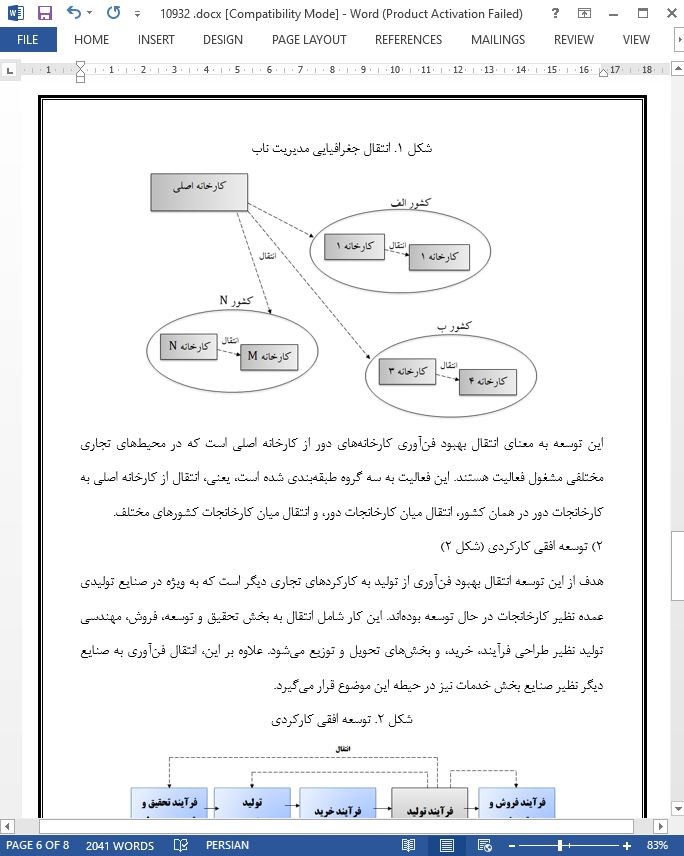
مدیریت ناب در عصر جهانی سازی
چکیده
مدیریت ناب در عصر جهانیسازی: رشد بهرهوری در اثر تغییرات در فنآوری و سازماندهی بهتر تولید پدید میآید. این دو فرآیند به طور همزمان فعالیت میکنند، و در عمل، تمایز بین تاثیرات هر یک از این فرآیندها دشوار است. این فرآیندها پویا هستند و در طول زمان بر فعالیتهای افراد تاثیرگذارند. در این سالهای اخیر، کارکردهای تولیدی دستخوش تغییرات سریع و جهانی شدهاند و از کشورهای توسعه یافته به کشورهای در حال توسعه انتقال یافتهاند. این مقاله به بررسی فلسفه مدیریت ناب و عوامل حیاتی برای انتقال موفقیتآمیز مدیریت ناب به کشورها میپردازد.
مقدمه
اساس فلسفه مدیریت ناب، از میان برداشتن عوامل هدر رفت منابع و هماهنگ کردن اقدامات ضروری به منظور برآورده ساختن نیازمندیهای بازار در کوتاهمدت و بلندمدت است. فلسفه مدیریت ناب با استفاده از عبارات گوناگونی بیان شده است: دستیابی بیشتر به اهداف با استفاده از تعداد کارمندان کمتر، کاهش فعالیتهای فاقد ارزش افزوده، کوچکسازی، و غیره. مدیریت ناب غالبا با مفاهیم کارایی و کاهش مازاد مرتبط است. با این حال، این فقط یک جنبه از مدیریت ناب است. یکی از جنبههای اساسی مدیریت ناب تلاش مستمر برای تولید محصولات بینقص، تحویل به موقع این محصولات، مشتریپسند بودن محصولات، عدم هدر رفت منابع و ساعات کاری و منابع دیگر، و وجود یک محیط کاری ایمن است. مدیریت ناب یک فلسفه برای بهبود مستمر است. چندین روش و راهبرد برای مدیریت ناب وجود دارد.
نتیجهگیری و تحقیقات آتی
هدف از این مقاله سهیم شدن در افزایش دانش مربوط به انتقال مفاهیم مدیریتی با تاکید ویژه بر تولید ناب بوده است. هدف زیربنایی این مقاله اتخاذ دیدگاهی کلگرا درباره این موضوع و نشان دادن چگونگی ترکیب دیدگاههای نظری مختلف برای تشکیل مدلی به منظور تحلیل این فرآیندهای انتقال بوده است.
Lean management in globalization era
Productivity growth comes from technological change and better organisation of production. Both processes operate simultaneously and, in practice, it is difficult to distinguish between the effects of each process. The processes are dynamic and affect individual activities differently over time. These years, manufacturing functions have been transferred rapidly and globally from mature countries to emerging countries. This paper is about the lean philosophy and the critical elements for successful transfer of lean management among sites and countries.
INTRODUCTION
The lean philosophy is all about eliminating waste and synchronizing necessities in order to, on the short and long term, meet the requirements of the market. The lean philosophy is expressed in several different statements: achieving more with less people, reducing non-value-adding activities, slimming etc. Lean is often associated with efficiency, reducing surplus. This however, is only one side of the lean philosophy. An essential aspect of the lean philosophy is a continuous striving for flawless products, that can be delivered on demand, customer specific, without wasting material, labor hours, and other resources in a safe working environment. The lean philosophy is a continuous improvement philosophy. There are several methods and techniques that can be used to become leaner.
CONCLUSIONS AND FUTURE WORK
The purpose of this paper has been to contribute to the knowledge base concerning the transferring of management concepts with a specific focus on Lean Production. The underlying ambition has been to take a holistic perspective on the matter and demonstrate how different theoretical perspectives can be combined to form a model for analyzing these processes of transferring.

مقدمه
انتقال مدیریت ناب
نتیجهگیری و تحقیقات آتی
INTRODUCTION
TRANSFERRING LEAN MANAGEMENT
CONCLUSIONS AND FUTURE WORK
- اصل مقاله انگلیسی با فرمت ورد (word) با قابلیت ویرایش
- ترجمه فارسی مقاله با فرمت ورد (word) با قابلیت ویرایش، بدون آرم سایت ای ترجمه
- ترجمه فارسی مقاله با فرمت pdf، بدون آرم سایت ای ترجمه
